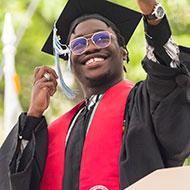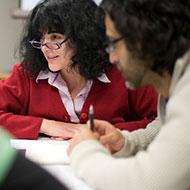Approval of petitions is usually guided by precedent.
- The Executive Officer reviews and approves standard petitions and refers complex and borderline cases to the Chair of the Committee. The Chair will act on behalf of the Committee in evaluating petitions for which the proper decision is clear, in light of CoC guidelines and Rules and Regulations of the Faculty. Other cases will be discussed with the Committee as a whole.
- The Committee may accept appropriate substitutions for General Institute Requirements (GIRs) with the express approval of relevant departments and the student's advisor. Students may not petition to waive a General Institute Requirement.
- The Committee never approves a student's program with fewer than the minimum total units required by Faculty Regulations for the SB degree. The Committee on Academic Performance (CAP) sometimes approves exceptions, as a "single deficiency," if the student makes a good effort but fails a subject during their last term before graduation.
The following sections describe the types of petitions and applications that fall under the purview of the CoC.
-
12.1 Humanities, Arts, and Social Sciences (HASS) Requirement
Students must petition the Subcommittee on the HASS Requirement (SHR) for all actions related to the HASS Requirement. At the end of each academic year, SHR provides a report to the CoC concerning the petitions it has reviewed during the year. The two general types of HASS petitions are:
- Acceptance of a subject which is not designated for HASS credit (including Harvard and Wellesley subjects). Transfer credit is approved by the SHASS Dean’s Office.
- Acceptance of two 6-unit subjects for one HASS subject.
-
12.2 Restricted Electives in Science and Technology (REST) Requirement
Because the list of subjects that fulfill the REST Requirement is intentionally very specific, and because students are advised to complete this requirement early in their academic careers, the Committee rarely approves REST substitutions. The Committee will only consider a REST petition that has been approved by both the student's advisor(s) and by the department that offers the REST subject and the proposed substitution. Students should contact the Committee staff for more information on the process.
-
12.3 Institute Laboratory Requirement
CoC generally denies petitions to substitute other work for the Institute Lab Requirement.
In particular, a student petitioning to substitute independent work (such as a UROP) for the Institute Lab is advised that such substitutions are very rarely approved. Because this work is not necessarily supervised closely by the faculty advisor, it is very difficult for the Committee to determine whether it fulfills the criteria of the Institute Lab Requirement. A student who nonetheless wishes to petition for such a substitution must obtain approval from the advisor, along with a comprehensive letter detailing supervision of the work performed and demonstrating that there was close contact with the student throughout the term.
Only if the project appears to be of outstanding quality and the faculty member can convincingly demonstrate an ongoing and close involvement with the work performed is the petition approved.16
- 16 While the CoC does not normally allow subjects taken at other institutions to be accepted for GIR credit, an exception may be made in cases where a cooperative arrangement exists between MIT and another institution for the teaching of the subject.
-
12.4 Communication Requirement
Students petition the Subcommittee on the Communication Requirement (SOCR) for all actions related to the Communication Requirement, including requests to waive the requirement. If SOCR acts on a petition to waive the requirement, it is forwarded to CoC for approval. CoC has final approval power on all substitutions regarding the General Institute Requirements. At the end of each academic year, SOCR provides a report to the CoC concerning the petitions it has reviewed during the year.
See Section 4 regarding the review of communication-intensive subjects.
-
12.5 Two Bachelor's Degrees
This program has been discontinued and was last mentioned in the 2010-11 Bulletin. The last cohort of eligible students entered MIT as first-year students during the 2007-08 academic year.
Students who had successfully petitioned to pursue two SBs but left MIT without earning an undergraduate degree may, if readmitted and otherwise meet the eligibility requirements, apply for a double major. Students who had successfully petitioned to pursue two SBs but left MIT after completing one SB are ineligible to return to complete the second degree and cannot be readmitted to complete a second major.
-
12.6 Double Majors
From the 2024-2025 Bulletin:
"Students may earn a bachelor’s degree with up to two majors by successfully completing the GIRs and the departmental requirements for each major. To add a second major, a student must apply to the Committee on Curricula (CoC) by Add Date of their penultimate term. Applications submitted after this deadline will be considered by the CoC at its discretion on a case-by-case basis.
"A double major program should be completed in eight to ten academic terms and should be planned in advance. A student's plan for completing both majors must be outlined in the application to the CoC. The application must also include the expected completion date for the degree, and it must be approved by both programs. Students should consult Student Financial Services regarding any impact that pursuing a double major might have on their eligibility for MIT or federal financial aid, particularly if they anticipate needing more than eight semesters to complete their studies.
"Students must select a second major in a different area from the primary major. Students pursuing a double major may also complete up to two minors, but a minor may not be taken in the same area as either of the major programs.
"Only registered undergraduates who have completed at least three terms at MIT, including at least one term with a declared major, may apply. Transfer students must complete at least two terms at MIT, including at least one term with a declared major. Students with cumulative averages below 4.0 will be considered by the CoC on a case-by-case basis. A student who has previously earned a bachelor's degree with a single major may not return to complete a second major.
"For details on eligibility, deadlines, and procedures, see Double Majors."
Additional CoC Guidelines
Students are expected to complete a double major program in eight to ten academic terms. The 2007-08 Chairs of CUP and CoC developed eligibility guidelines to launch the double majors program. The CoC revised the guidelines in 2016-17. To apply for a double major, a student must:
- Be currently registered as an undergraduate.
- Have completed at least three terms at MIT, including at least one term in a department with a declared major. Transfer students must complete at least two terms of work at MIT, one of which must be in a department with a declared major.
- Have a cumulative grade point average of 4.0 or higher. Students with a lower GPA will be considered on a case-by-case basis and must append a letter to their application that explains why an exception is justified.
- The student must obtain statements from both advisors indicating that they can complete the double major within the normal timeframe for earning a bachelor’s degree, with a reasonable course load, while maintaining their current GPA. The second major should not delay the student’s graduation date.
- Apply on or before the Add Date of the term prior to the term in which they intend to graduate. The CoC will consider late applications only under exceptional circumstances; it will review late applications at its discretion on a case-by-case basis.18
To earn a double major, students must complete all the degree requirements of both majors. Students may combine any two majors of their choosing within the guidelines outlined in the Bulletin.
Changing a double major program
If a student plans to pursue a different degree program within the original department(s), the student must file a change of major form with the Registrar’s Office. If a student plans to pursue a program that is offered outside one or both of the original departments, the student must file a new application with the CoC by the required deadline. The CoC will review the new application in accordance with the guidelines noted above.
Double Major Candidates and the Communication Requirement
A student who desires to receive a bachelor’s degree with two majors must pass two CI-H subjects (Communication Intensive in the Humanities, Arts, and Social Sciences), to fulfill the CI-H portion of the Communication Requirement. Further, the student must pass CI-M subjects (Communication Intensive in the Major) that fulfill the communications component of each major. Normally, this rule implies that the student will pass four CI-M subjects, that is, two in each major program. In certain cases, a CI-M subject may be common to both departments – i.e., a CI-M subject that is already approved as an appropriate CI-M for both major programs. These CI-M subjects may be used to fulfill the communication component of the two majors simultaneously.
- 18 The double major program became available to students graduating in June 2010 or later.
-
12.7 Delayed Completion of a Degree
Students who do not graduate within ten years of their original date of entry must generally fulfill the requirements for the class with which they will graduate. However, subjects previously taken to satisfy the General Institute or Departmental Requirements may be counted toward current requirements with the permission of the governing bodies that administer those requirements.
Students on leave from MIT who request to return to pursue an SB degree must certify in writing that they have not earned a Bachelor’s degree (or the equivalent) from another institution and that they are not currently a candidate for such a degree at another institution.
Students should contact Student Support Services (S^3) with any questions about the return process. Upon receipt of a referral from S^3, the CoC will coordinate the review of a returning student’s General Institute Requirements (GIRs) with the appropriate Faculty committees. Questions about the CoC’s review process may be directed to the Executive Officer of the CoC in the Registrar's Office, (curricula@mit.edu). Students should contact the undergraduate administrator in their department with questions about the requirements for their chosen major.
-
12.8 Receiving Academic Credit for ROTC Subjects
CoC does not review or approve petitions to grant academic credit for a non-credit bearing ROTC subject.





